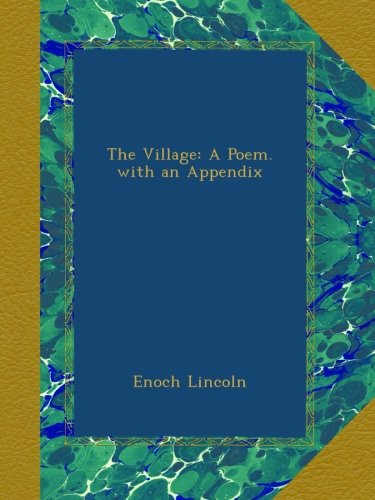Background
Enoch Lincoln, the fourth son of Levi and Martha (Waldo) Lincoln, and brother of the younger Levi, was born on December 28, 1788 at Worcester, Massachusetts, United States.



(This book was originally published prior to 1923, and rep...)
This book was originally published prior to 1923, and represents a reproduction of an important historical work, maintaining the same format as the original work. While some publishers have opted to apply OCR (optical character recognition) technology to the process, we believe this leads to sub-optimal results (frequent typographical errors, strange characters and confusing formatting) and does not adequately preserve the historical character of the original artifact. We believe this work is culturally important in its original archival form. While we strive to adequately clean and digitally enhance the original work, there are occasionally instances where imperfections such as blurred or missing pages, poor pictures or errant marks may have been introduced due to either the quality of the original work or the scanning process itself. Despite these occasional imperfections, we have brought it back into print as part of our ongoing global book preservation commitment, providing customers with access to the best possible historical reprints. We appreciate your understanding of these occasional imperfections, and sincerely hope you enjoy seeing the book in a format as close as possible to that intended by the original publisher.
https://www.amazon.com/Village-Poem-Appendix-Enoch-Lincoln/dp/B00A5SWR2Q?SubscriptionId=AKIAJRRWTH346WSPOAFQ&tag=prabook-20&linkCode=sp1&camp=2025&creative=165953&creativeASIN=B00A5SWR2Q
Enoch Lincoln, the fourth son of Levi and Martha (Waldo) Lincoln, and brother of the younger Levi, was born on December 28, 1788 at Worcester, Massachusetts, United States.
Lincoln attended Harvard College for a short time but left without taking a degree. Having studied law in Worcester, he was admitted to the bar in 1811.
In 1811 Lincoln began practising at Salem, but moved, in 1812, to Fryeburg in the District of Maine, still a part of Massachusetts. Fryeburg was then a center of considerable importance and he spent five years in practice there, moving to Paris, Maine, in 1819. He was assistant United States district attorney, 1815-1818. Although a young lawyer of promise, he soon devoted most of his time and energy to politics.
On March 16, 1818, he was elected to the federal House of Representatives to serve the unexpired term of Albion K. Parris, recently appointed to the federal bench, and took his seat in the second session of the Fifteenth Congress, November 16, 1818. He was reelected to the four following Congresses, his total service covering the period 1818-1826. Maine had, in the meantime, 1820, been admitted to the Union as a separate state. He rarely spoke and his congressional career was without special distinction. Resigning from the House in 1826, he was elected governor of Maine that same year, and was reelected in 1827 and 1828. He was a popular and successful executive and encountered little opposition.
His health had been failing for some time and he had declined another nomination, hoping to devote himself to literary work in Scarborough, where he had lately established a residence. He had several avocations which throw considerable light on his character and temperament. In 1816 he published a poem, The Village (printed by Edward Little & Company, Portland), evidently based on his observation of life in Fryeburg. More important was his interest in Indian languages and tribal institutions in Maine, which led him to carry on investigations there and in neighboring British territory. This study naturally brought him into contact with the earlier history of the white settlements in Maine. From his unfinished work in this connection, two studies were afterwards printed, "Remarks on the Indian Languages" and "Some Account of the Catholic Missions in Maine".
His death occurred in Augusta, Maine, a few days after he had participated in the ceremonies attending the laying of the cornerstone of a new academy for young women.
(This book was originally published prior to 1923, and rep...)
Lincoln was a member of the Republican Party. His messages to the legislature, which show considerable literary ability, dealt with problems of the new state, then essentially a frontier community. The fact that the dispute with Great Britain over the Northeastern Boundary was becoming serious probably accounts for his emphasis on the need of protection for the state's long maritime and inland frontiers. He insisted on the validity of Maine's title to the entire area in dispute and stated emphatically his belief that the federal government had no right, without the consent of a state, to cede the property of that state. The portions of his messages dealing with the boundary question are important items in the documentary history of that protracted diplomatic controversy, which remained unsettled long after his death.
Lincoln never married.
